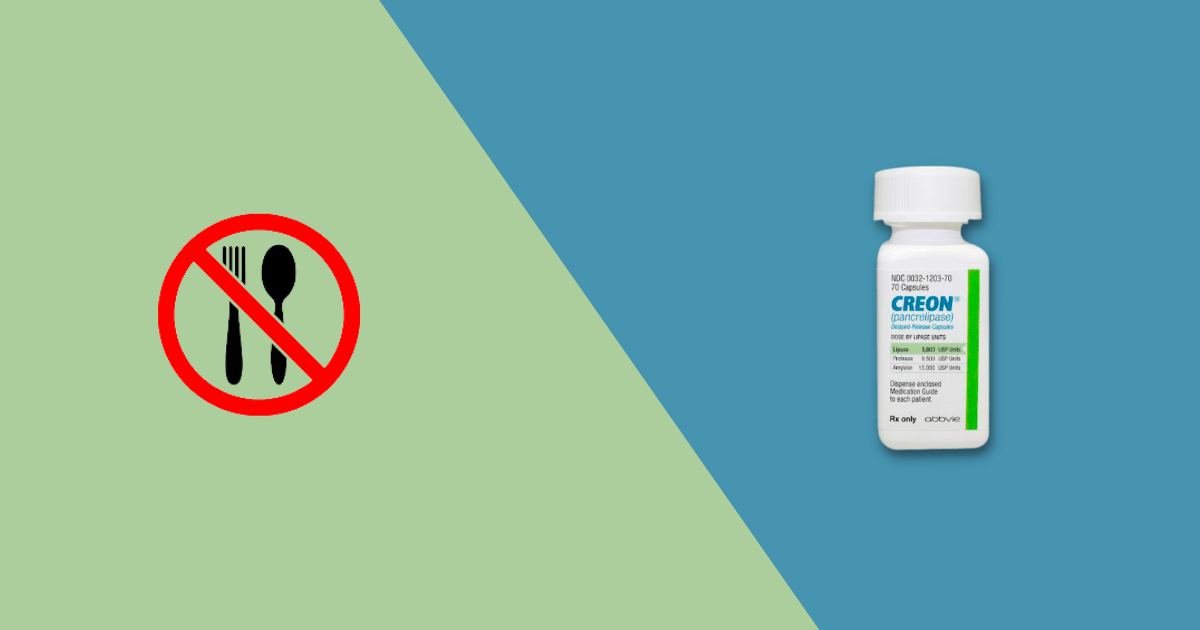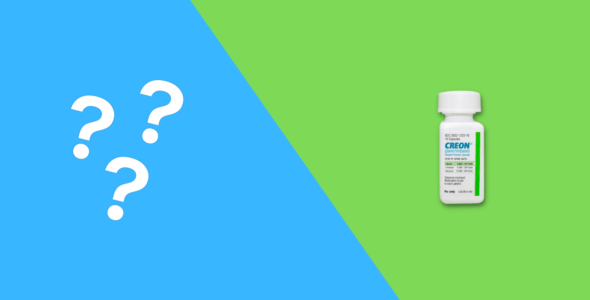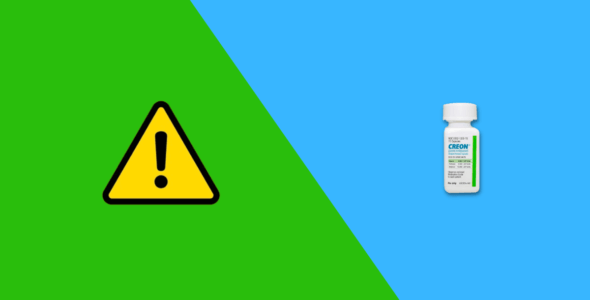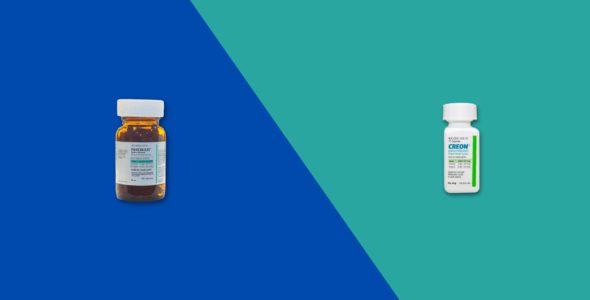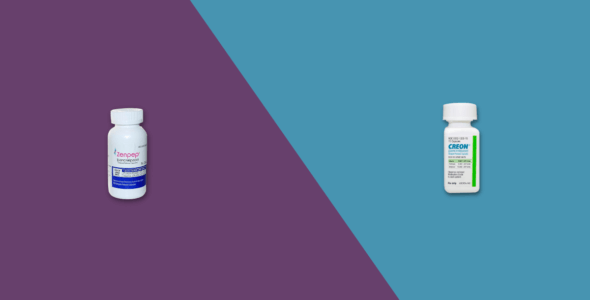What foods to avoid when taking Creon
Table of contents
Creon is a prescription medication used to manage Exocrine Pancreatic Insufficiency (EPI). You may need to make changes to your diet and health when taking Creon as your pancreas won’t produce enough of the enzymes which are needed to properly break down the fats, proteins, and carbohydrates in your food, which may result in you not getting enough nutrients. With EPI, you will need to ensure that you are getting enough nutrients and vitamins, while at the same time avoiding foods that may irritate your digestive tract.
What is Creon (pancrelipase)?
Creon is the brand name of the prescription drug pancrelipase, manufactured by Abbvie Inc. It’s used to treat digestive problems caused by a lack of enzymes produced by the pancreas.
Pancrelipase is a mixture of three enzymes: lipase, protease, and amylase. These enzymes are normally produced by the pancreas and are necessary for the proper digestion of fats, proteins, and carbohydrates in food.
Creon is used to treat exocrine pancreatic insufficiency (EPI). This condition occurs when the pancreas doesn’t produce enough enzymes. Enzymes are needed to break down foods so that your body can absorb the nutrients. Without enough enzymes, you can develop malnutrition and other serious health problems.
Creon is also used to treat cystic fibrosis, a condition that affects the lungs and digestive system.
If you forget to take a dose of Creon, take it as soon as you remember. If it’s almost time for your next dose, skip the missed dose and continue on your regular schedule. Do not take two doses of Creon at the same time. This could cause an overdose and lead to serious side effects.
Take your medication as prescribed by your healthcare professional. Always take Creon capsules with snacks or meals and try to take the drug when you start your meal or snack. Always swallow the capsules whole with water or another liquid. Do not crush the Creon capsules. You can also open the capsule and mix the granules inside with a teaspoon of cold, soft, acidic food.
How does Creon work?
Creon works by replacing the natural digestive enzymes in their small intestine that are normally produced by the pancreas. These enzymes help your body break down and absorb fats, proteins, and carbohydrates from food.
Enzymes are proteins that act as catalysts in chemical reactions in the body. Lipase enzymes help break down fats, protease enzymes help break down proteins, and amylase enzymes help break down carbohydrates.
Creon is a mixture of these three types of enzymes. By replacing the missing enzymes, Creon helps your body digest food and absorb nutrients. Creon may promote weight gain and not weight loss.
Creon is available in different forms and strengths. The amount of enzymes in each form is different. Your doctor will prescribe the strength of Creon that’s right for you based on the severity of your condition and how well your body responds to the drug.
What are the most common side effects of Creon?
Creon can cause mild or serious side effects.
The most common side effects of Creon include:
- increased blood sugar levels (hyperglycemia) or decreased blood sugar levels (hypoglycemia)
- abdominal pain (stomach pain)
- abnormal or frequent bowel movements
- gas
- vomiting
- dizziness
- sore throat
- cough
Some people may also experience an allergic reaction to Creon. Symptoms of an allergic reaction may include:
- hives
- difficulty breathing
- swelling of the face, lips, tongue, or throat
If you experience any of these side effects or experience an allergic reaction when taking Creon, call your doctor or seek emergency medical attention. Your doctor may be able to prescribe a different medication if medically appropriate for you.
What foods should I avoid with Creon?
You will need to make some changes to your diet when you’re taking Creon. Foods that are high in fat, protein, and carbohydrates can be difficult to digest and may make your symptoms worse.
Your doctor or a registered dietitian can help you create a balanced diet that includes the nutrients you need while avoiding foods that may irritate your digestive system.
In general, you should avoid:
- fiber-rich foods – foods like lentils, peas, barley, and brown rice are known to be higher in fiber, and certain bread and carrots are known to be lower in fiber.
- fried foods
- processed meats
- alcohol – multiple years of excessive alcohol use could increase your likelihood of EPI and pancreatitis
- smoking
- eating large meals – you should avoid eating large meals as it makes your digestive system work more than normal, and you are less likely to have uncomfortable symptoms of EPI if you eat 4 to 5 small meals per day, instead of having 3 large meals
You should also limit foods that are high in protein, such as red meat and beans. You should also avoid foods that are high in carbohydrates, such as bread, pasta, and sweets.
You may also need to avoid foods that are spicy, acidic, or high in fiber. These foods can irritate your digestive system and make your symptoms worse.
It’s important to talk to your doctor or dietitian about which foods you should avoid with Creon. They can help you create a balanced diet that meets your nutritional needs.
Get your Creon medication for only $49 per month
Get StartedWhat are the best foods to eat with Creon?
In general, you should eat a varied healthy diet that includes:
- low-fat food
- proteins
- carbohydrates (carbs)
- healthy fats such as monounsaturated fat, polyunsaturated fat, and omega-3 fatty acids
- minimally processed foods
- lean proteins such as turkey breast or chicken, egg whites, or tuna in water
- drink plenty of fluids like fruit juices, broth and drinks without caffeine
Olive oil, peanut oil, seeds, nuts, and fish such as tuna and salmon, all contain healthy fats which are recommended to eat when taking Creon.
Instead of eating 3 large meals per day, it is recommended to eat several smaller meals per day with EPI.
Who can take Creon?
Creon is safe for most adults. However, it may not be suitable for people with certain medical conditions, such as diabetes or kidney disease.
Pregnant women and children should also avoid taking Creon.
If you have any concerns about whether Creon is right for you, talk to your doctor.
Can I take Creon with other medications?
Creon can interact with other medications, vitamins, supplements, or herbs you may be taking. A drug interaction is when a substance changes the way a drug works. This can be harmful or prevent the drug from working well.
To help avoid interactions, your doctor should manage all of your medications carefully. Be sure to tell your doctor and pharmacist about all the products you use (including prescription drugs, nonprescription drugs, and herbal products). Your doctor should determine whether Creon is safe for you to take.
Medically reviewed
A medical professional has reviewed this article.


Jamie Winn, PharmD
Jamie Winn, PharmD
Dr. Jamie Winn received his Doctor of Pharmacy in 2002 from the University of South Carolina College of Pharmacy, Columbia, SC. Jamie is a medical reviewer for NiceRx.

